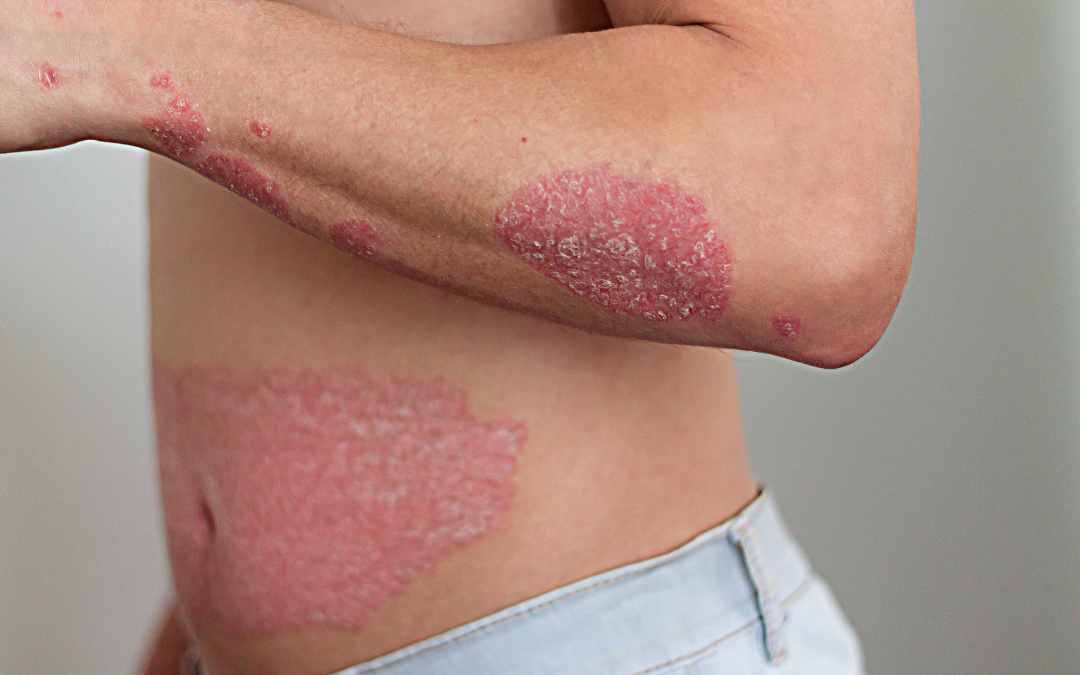WHAT CAUSES PSORIASIS?
As with a surprising number of medical conditions, for a long time the exact causes of psoriasis had not as yet been established beyond all doubt. But, whilst the traditional view of psoriasis was that it is a condition of the epidermis, the uppermost layer of the skin, research over the past few years has begun to indicate otherwise.
This research has indicated that far from being a condition that is only related to the epidermis, the causes of psoriasis go much deeper than this. The root cause of psoriasis is inflammation – mostly caused by poor diet, exposure to toxins, stress factors, with an element of genetics.
Additionally, research indicates that psoriasis is a condition that is caused by malfunctions in the sufferer’s immune system when certain immune cells are activated and subsequently become overactive.
PSORRIASIS PLAQUES?
In any individual who has a perfectly normally functioning immune system, white blood cells or T-cells produce antibodies that are designed to repel bacteria and viruses. However, it is now believed that in the case of a psoriasis sufferer, these cells begin to fight an imaginary infection or try to heal a wound that doesn’t exist by creating a surfeit of new skin cells to repel the imaginary invader or to repair the non-existent damage. This in turn causes the plaques or skin lesions that are endemic to plaque psoriasis to appear.
Under normal circumstances, the life cycle of the average skin cell for someone who is totally healthy is around about 28 days, but it is believed that in psoriasis sufferers, their immune system is creating far too many cells.
Moreover, because these cells are being produced so quickly, they mature in as little as three to six days before moving to the surface of the skin.
Consequently, because these cells are not dying quickly enough, they build up on the surface of the skin, layer upon layer, and thus the psoriatic plaques are formed. Because of this research, we now have what is believed to be a reasonably accurate idea of what causes psoriasis.
What we do not know however is exactly why some individuals suffer from psoriasis whereas others do not. There are on the other hand some generally accepted factors that make some individuals more likely to suffer psoriasis than others.
FAMILY HISTORY?
Research indicates that some 30% of people who develop psoriasis have a family history of the condition, but it is also true that many parents who suffer from psoriasis will have the children who have no problems of their own.
On the other hand, there will be people who develop psoriasis who have no family history of the condition, so to suggest that psoriasis is hereditary could be a little misleading. It is however true that researchers have established that there are certain genetic combinations and/or mutations that seem to make anyone who has them predisposed to suffering from psoriasis.
At the present time, researchers believe that there are nine different genetic mutations that might play a part in making certain people predisposed to suffering from psoriasis. However, there is one particular mutation of chromosome-6 known as PSORS-1 (for psoriasis susceptibility 1) which appears likely to be the particular mutation that plays the biggest role in deciding who is likely to become a psoriasis sufferer, and who is not.
According to a study published in the American Journal of Human Genetics in 2006, research has established that the role of this particular genetic mutation was seen in more than 2700 psoriasis sufferers drawn from nearly 680 families in which one or both parents were psoriasis sufferers.
It is now generally agreed within the research and scientific community that this particular mutation causes the T-cells to behave differently, hence the connection with psoriasis. But it is also the fact that this particular genetic mutation does not necessarily mean that an individual is certain to become a psoriasis sufferer. Indeed, the same research study which was carried out by James T. Elder, MD, PhD suggests that for every individual with the PSORS-1 gene that develops psoriasis, there will be 10 other individuals carrying exactly the same gene who do not develop the condition.
Moreover, it should also be noted that many of the same mutations that are believed to make an individual predisposed to psoriasis can also have a connection with other immune mediated conditions such as type 1 diabetes or rheumatoid arthritis as well.
It therefore follows that whilst some people who have a particular genetic mutation might be more prone to psoriasis, it is possible that instead of psoriasis, they may suffer from diabetes or rheumatoid arthritis.
In fact, whilst the risk of developing psoriasis is increased if one or both parents are also sufferers, the risks of developing other immune mediated conditions especially Crohn’s disease or diabetes are both increased in the same situation.
From all this, it might be natural to assume that having some family history of psoriasis is likely to mean that you will develop psoriasis yourself, but in many cases, this simply does not happen. We should therefore ask the question, why does this happen (or indeed not happen)?



0 Comments